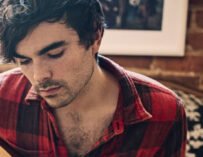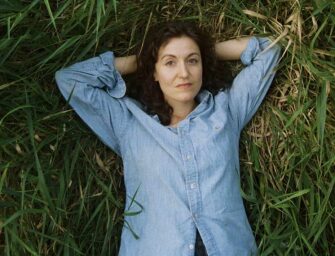
Andrew Combs: “I believe that there’s an extreme common thread between everything I’ve done.”
We spoke with the Dallas-born country musician to learn about his new direction and co-writing with friends like Dylan LeBlanc
Songwriting first became aware of the music of Andrew Combs when we visited Nashville back in 2015. Since then, we’ve keenly followed his career and been rewarded by a songwriter whose sound continues to evolve. Though loosely anchored in country and folk, his musical palette seems to broaden with every release – we’d certainly encourage you to listen to the sweeping landscapes of his 2017 album Canyons Of My Mind. In 2018, Combs also released an EP 5 Covers & A Song, containing versions of tracks by artists such as The Strokes and Radiohead.
Combs most recent album, Ideal, continues his evolution. Taking him out of Nashville, it was recorded in Brooklyn with producer Sam Cohen (Kevin Morby, Benjamin Booker), it’s definitely his loosest record yet, with a relaxed feel to it perfectly suited to his sleepy vocals.
Ahead of his upcoming UK tour, we caught up with Andrew to learn a little more about how the record was written and recorded…
Did recording 5 Covers & A Song make it easier to expand your style and sound on this album?
“That’s a good question, it probably did. I do think it might have helped me tap into a world of music that I hadn’t in a long time. With 5 Covers & A Song, a lot of those tune were songs that I listened to on repeat when I was a lot younger, back in high school and early college. Then I got pretty full-on in the country and folk world, and still am to a certain degree. I think it probably did remind myself that there were other genres of music that I enjoy just as much.”
Will you write the songs in a different way depending on the finished sound you have in your head, or does your process tend to be the same no matter what?
“With this new record, I definitely was experimenting with the way I write, when I was writing by myself. There are a few co-writes on there, so those depend on the other person in the room. But those songs that I wrote by myself, I was experimenting a little bit more, kinda like throwing paint at the wall and seeing what sticks. I am thankful that my songwriting background is in country and folk music because there is so much structure that I abide by when I’m writing a song, but at the same time I was experimenting more with melody and how words fit in with that melody, not being so concerned about telling a verbatim story of a person.
“After I recorded the record I was reading the Jeff Tweedy autobiography [Let’s Go (So We Can Get Back)] and I really enjoyed his process of writing songs, it was very similar to what I was doing. I’m sure a lot of people do it that way – where you map out the whole song sonically and then these words just seem to fall into place. He would make a word-tape of mumbo jumbo and then go back and make them coherent, to some degree. That was very similar to what I was doing for some of the songs, and it was interesting that someone I admire had done the same thing.”
Was it helpful to be away from Nashville and record in Brooklyn?
“I didn’t really write anything up there but sonically the record definitely stepped outside of Nashville and into Brooklyn or New York. We did the record in eleven days but it was split up into three trips, a few days here and there. It was cool being in New York but at the same time we were in a basement studio and it didn’t even have any windows or anything, so it wasn’t like the sounds of the city were entering into the musical landscape or anything like that. We were there to work. Sam [Cohen] the producer definitely brought a different sonic power to the table but I don’t know how much New York or Brooklyn influenced me.”
What is it you look for in that producer relationship?
“Well, first of all with a producer I always want to respect their material and what they’ve worked on, so that was the first step. The second step was I went up there and we did a two-song trial just to see if we got along. Then, I’m totally open with a producer commenting on writing and also for them to take that song and put some musical bed beneath it that I had in my head or take what I had in my head and make it even better and I think he pulled that off.”
Is there a best way of making that happen? For example, do you need a shared musical language?
“Again, I think that comes back to whether you get along with the person and you can just talk to them. I’ve been around people that I couldn’t speak about music with, because we’re just on different levels. Sam and I had a lot of the same influences, all my reference points were things that he knew, which was a big thing for me. When I’m referencing something like a Karen Dalton album from the 60s or 70s he knew what I was talking about. But there’s not like a set language that I’m looking for.”

Andrew: “Once you enter the room with somebody else, you’re writing something different than you would have on your own”
Are you after a similar dynamic with the people you co-write with?
“Yeah, for sure. That Joe Henry is not the producer Joe Henry, he’s a really awesome cool dude who lives out in Colorado and he was one of John Denver’s only co-writers and he’s done stuff all over the map. He’s a lyricist and an author and you could write a whole article on him. I work with a few guys who are just lyricists, which is always fun for me as I can do the melody thing exactly the way I want to and we can just hone in on the words. Dylan LeBlanc’s a good buddy of mine, I had a verse thing going and didn’t know where to go.
“I used to co-write all the time because I used to do the publishing deal thing on Music Row, where I was writing one or two songs a day. I just got really fed up of that world to a certain degree and felt like I was compromising what I did, and now it’s mostly just with good friends and people I worked with for years, that I trust. I really only co-write with six different people now, whereas when I was doing the publishing thing I was all over the place.”
And when you’re co-writing do you still feel like you’re creating songs that you couldn’t if you were writing alone?
“Yeah, I mean co-writing should elevate the song. If I can’t write something by myself I will usually ask somebody to come in and help. Dry Eyes, I had that melodically mapped out and had things started but they weren’t really hooking me. With Burton Collins, who’s also just a lyricist, we worked on that and thrashed it out in a few hours. Sometimes I just need that starting point that I have a hard time with. Then, once we’re rolling, it’s easy. Every co-write is different but they’re always going to change the way a song comes out.
“Even if I write the whole song but I’m “co-writing” with somebody, I’m thinking about it differently; writing things that will hopefully make them perk up or say something. I think that’s the Nashville way of going about everything 50/50 no matter what. In LA if you’re a pop singer and write part of the song you’ll only get a part of the credit and part of the publishing rights, but here in town (and I fully agree) once you enter the room with somebody else, you’re writing something different than you would have on your own.”
Do you think that background still stands you in good stead when it comes to writing and productivity?
“Definitely and also, like I said earlier, just the structured writing that country music and folk music abide by, I think it’s beneficial to me – at least at this point in my writing career. I don’t get up every day and pick up my guitar and write, but I’ll definitely get up every day and try and write something down, whether a word, a sentence, a whole song or a mumbled melody into my phone for later. Doing something productive to keep my brain focussed and let my songwriting muscle flex.”
How about the other end of the process, are you someone who likes to tinker or do you know when a song is finished?
“The best way for me to edit lyrics is to have the song totally done and then, while I’m driving, maybe on tour and sometimes I work a job here in town delivering packages, just sing it over and over and little flaws will then pop up and I’ll edit them. I definitely try and go back over most songs and try and work out the kinks.”
When you take your music in a new direction are you hoping that your existing fans come on that journey with you?
“It hasn’t been a worry yet. I believe that there’s an extreme common thread between everything I’ve done and hope that somebody that bought my first record will see where I’m going and developing, but I don’t know if that’s not a worry because I obviously care to a certain degree but I am going to be who I am. I can’t really change that but I want people to listen because that’s how I make my living.
“Obviously I think it any artist tells you they don’t care if people like their work then they’re lying, because I do hope people like it. And I hope it takes me to a place where more people come to shows and more people take interest and I can keep doing this, challenge myself with each record and keep it interesting for myself. That I guess is the main goal, but I can’t do that unless other people like it too – so that’s something I have to be conscious of, of course.”
Lastly, what can we expect from one of your upcoming live shows?
“I’ll have a big band this time, which should be fun. We’re going to play the whole record and some old stuff and have some fun!”
Ideal Man is out now and Andrew will be touring the UK next month. For all tour dates, head over to andrewcombsmusic.com



































Related Articles